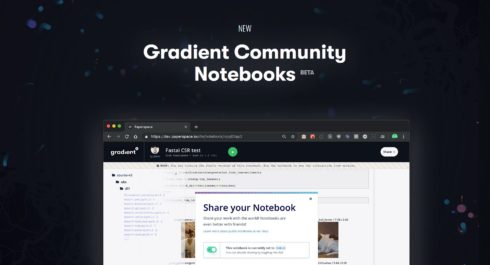
Paperspace announced “Gradient Community Notebooks,” a free cloud GPU service that was designed for developing machine learning (ML) and deep learing solutions. It’s based on Jupyter notebooks.
The service enables developers to collaborate while using various deep learning frameworks such as PyTorch, TensorFlow, Keras and OpenCV.
“This is precisely why we created Gradient Community: to make GPU and ML development resources widely accessible and easy to deploy. Our focus on empowering developers with cutting-edge technology, and a means to collaborate, supports our mission to help every developer become an AI developer,” said Dillon Erb, CEO and co-founder of Paperspace.
With Gradient Community Notebooks, users can get started from scratch with a new notebook or leverage pre-configured projects from the Gradient ML-Showcase, according to the company.
The full details are available here.
spaCy v 2.2 released
Explosion introduced the spaCy version 2.2 update, which expands the Natural Language Processing library and adds new features for training, evaluation and serialization for the open-source AI solution.
The new version includes a word replacement system that also supports paired punctuation marks, such as quote characters. It also introduces pretrained models for Norwegian and Lithuanian.
Explosion also said it made improvements to error messages, updated the documentation and made the evaluation metrics more detailed to improve the CLI.
The full details on spaCy 2.2 are available here.
Fugue announces support for Open Policy Agent
Autonomous cloud infrastructure security and compliance company Fugue announced its support for Open Policy Agent (OPA), an open source policy engine and language for cloud infrastructure.
Fugue said it is driving the adoption of OPA to address use cases such as for securing cloud environments on Amazon Web Services (AWS) and Microsoft Azure. Fugue also added support to its product for customer-defined rules written using OPA and Rego.
“Fugue has been developing policy-as-code solutions for some time, and now we’re offering an easy-to-use, open source solution for writing policies for cloud infrastructure,” said Phillip Merrick, CEO of Fugue. “Our customers can use the same open language for defining their cloud infrastructure policies in Fugue that they are using for other enterprise policy needs. This eliminates the need to learn other vendors’ proprietary, inflexible policy languages.”
The full details of the new advancement are available here.
VS Code now supports native editing of Jupyter Notebooks
VS Code now supports the native editing of Jupyter notebooks inside Visual Studio Code with the October release of the Python extension.
Users can directly edit .ipynb files, manage source control, open multiple files and leverage productivity features such as IntelliSense, Git integration and multi-file management.
Microsoft said that one of the main drivers of the integrations was the frequent requests by developers to have “a more notebook-like layout to edit their Jupyter notebooks inside VS Code.”
The full list of capabilities this brings can be viewed here.





